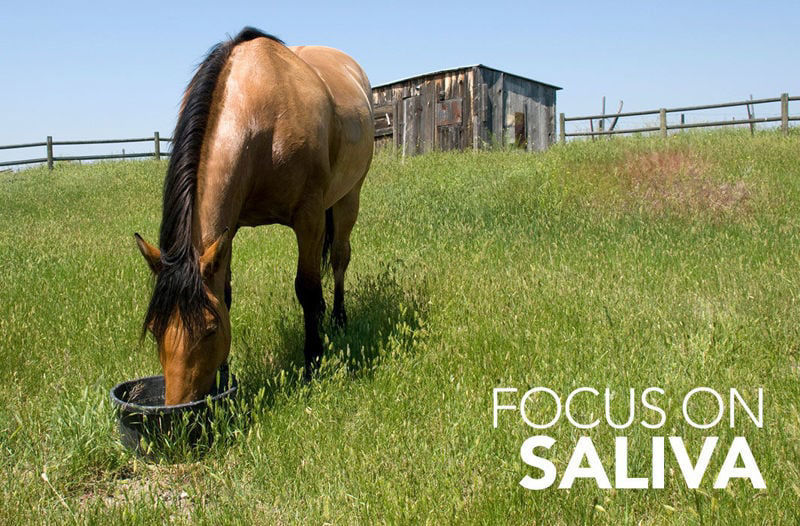Horses have three pairs of salivary glands, the parotoid, sublingual and mandibular producing almost 40 litres of saliva every day. These Salivary Glands are ‘activated’ when the horse chews and Saliva is produced. The more the horse chews, the more Saliva is produced.
Saliva performs many functions:
- It lubricates food through the digestive tract
- It helps to buffer the stomach acid as it contains Sodium Bicarbonate which is a natural buffer
- It helps to maintain a stable pH throughout the digestive tract
What the horse eats determines how much saliva is produced. Research has shown that a horse fed a forage-based diet of hay, will chew 3000-3500 time per 1kg of hay and product 4-5 litres of saliva. This is in contrast to a horse fed a diet of concentrates, where only 350-450 chews occur per 1kg of feed and only 1 – 2 litres of saliva are produced.
Saliva has a protective effect on the gastric tissues. It is well accepted that the majority of horses on higher forage and lower or no concentrate diets will have a decreased risk of Gastric Ulceration due to the amount of Saliva that is produced naturally.
Extending eating time is a great way of encouraging more saliva production and protecting against gastric issues such as Ulcers.
You can extend your horse's eating time by:
- Feeding forage – hay, haylage or even straw, will extend eating time when compared to feeding concentrate diets
- Using a slow feeder net or something similar to help reduce the rate of intake making the forage last for longer
- Grazing - if you have a good doer and access to grazing needs to be restricted, try turning your horse out wearing a muzzle or strip grazing their field
- Adding a short, chopped fibre such as a chaff* to your horse's hard feed
*Some short chop chaff is made of or contains Alfalfa, which is naturally high in Calcium and can therefore assist further in buffering stomach acid and maintaining gastric pH.
Problems affecting saliva production
Dental issues can affect chewing which has a knock-on effect on the product of Saliva and the digestive processes. As part of your horse's care you should ensure that regular dental check-ups are done to maintain the health of the teeth and mouth.












